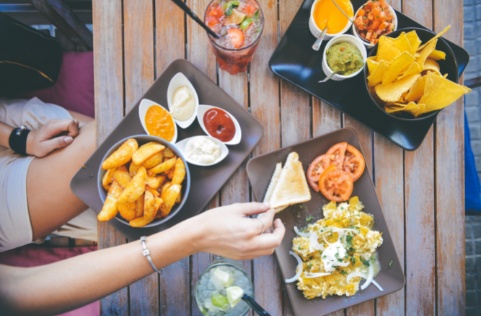
Have you ever had a thought pop into your brain telling you what you "should" and shouldn't eat? Say hello to your Food Police. The little voice that is in your head and judges your food choices. A product of diet culture and disordered language around food and bodies.
While many of us grapple with the Food Police, we typically have different "rules". Some in pursuit of thinness while others for the "ideal picture of health". No matter what, The Food Police can keep us trapped in a vicious diet cycle that is, ultimately, harmful for your health. Let's break it down.

what is the food police?
The food police is your inner dialogue that pops in your head with unhelpful thoughts and judgements about your food choices. These are the thoughts that tell you you are “being bad” for eating certain foods or even “good” for others.
These thoughts are so unhelpful because no food is morally superior or inferior. Sure, some foods have a higher nutritional value than others, but they are all perfectly fine foods that might be perfectly appropriate in the moment. Your body can handle all kinds of foods, so call out your inner food police and reframe those thoughts with helpful thoughts.
3 ways to challenge the food police
Challenging the food police really means trusting yourself and your body. Instead of making food choices based on external factors like what we think we should be eating, we are making food choices based on what we want to be eating.
1. examine your food rules
As a result of diet culture’s influence, you may have food rules that you believe and follow ritually. These rules may have developed over time, or have been taught to you from a young age. Food rules typically come from the avoidance of foods or rigid structure around food/ the eating experience that are spoken by the food police. These rules rarely have any leeway, so if you break them, you believe you have failed.
Remember, eating food that you enjoy does not make you a failure! It actually allows you to honor yourself and your body. When we challenge the food police and our food rules and eat the foods that are intimidating, we are slowly breaking down the walls of diet culture to reach food freedom.
2. evaluate your belief system around food and body
Think about your thoughts and beliefs around food, and pay attention to what may actually be a disordered thought. For example, one may sound like “I need to eat less carbs, they are bad for me.” Many of these thoughts have become automatic to us, and are typically deeply rooted inside us.
To challenge the food police with these thoughts, take a moment to pause, hear and observe these thoughts, and think to yourself:
Are these thoughts actually true? Have any of these thoughts, and moreover the actions that typically following them, actually ever benefited you?
Has eaten carbs ever harmed you? How do you typically feel after eating carbs? Do you genuinely enjoy carb containing foods? What about the health benefits of carbs, like carbs being your brain’s #1 source of energy and fuel?
Now, let’s focus on reframing this thought. Maybe it is in the past, the more I avoid carbs the more I end up craving them and later binging on them. When I label carbs as bad, I end up eating more carbs. When I add carb containing foods to my diet, I am more full and satisfied after meals. Use past experiences to encourage what you know to be realistic and true about the disordered thought, essentially “disproving” the food police.
3. keep your feelings in mind
Our thoughts have a big impact on our feelings, so it would make sense that negative, judgemental thoughts would negatively impact our feelings and mood.
Think about the feelings that may come up around food: anxiety, stress, fear, disappointment, sadness, envy, anger, shame.
Now think about the behaviors that follow from those negative feelings and emotions. Common results are being right back in the restrict and binge cycle, picking yourself apart, overeating, and continuous loss of touch with your body’s natural hunger cues.
When we pause to challenge the food police and reframe these negative thoughts, it impacts our overall wellbeing.
tell the food police "no"
Scream a loud "NO" to thoughts in your head. The food police monitors the unreasonable rules that dieting has created. The police station is housed deep in your psyche, and it's loud speaker shouts negative barbs, hopeless phrases, and guilt-provoking indictments. Chasing the food police away is a critical step in returning to intuitive eating. Imagine the freedom when you do!
If Intuitive Eating sounds amazing but potentially a little intimidating - check out our Intuitive Eating Course to help you lay some solid groundwork with Intuitive Eating.

your next steps
At NourishRX, we understand that finding the right treatment for an eating disorder can be overwhelming. We are here to provide the right support, nutrition education, and guidance you need to reach your goals. If you're concerned about how to take a step forward with your eating disorder recovery, please don't hesitate to reach out. We offer virtual nutrition counseling for those in Massachusetts and beyond. If you're interested in working with us:
- Book an Appointment
- Learn More About Us
- Begin Your Intuitive Eating Journey!
Comments Off on 3 Ways to Challenge the Food Police